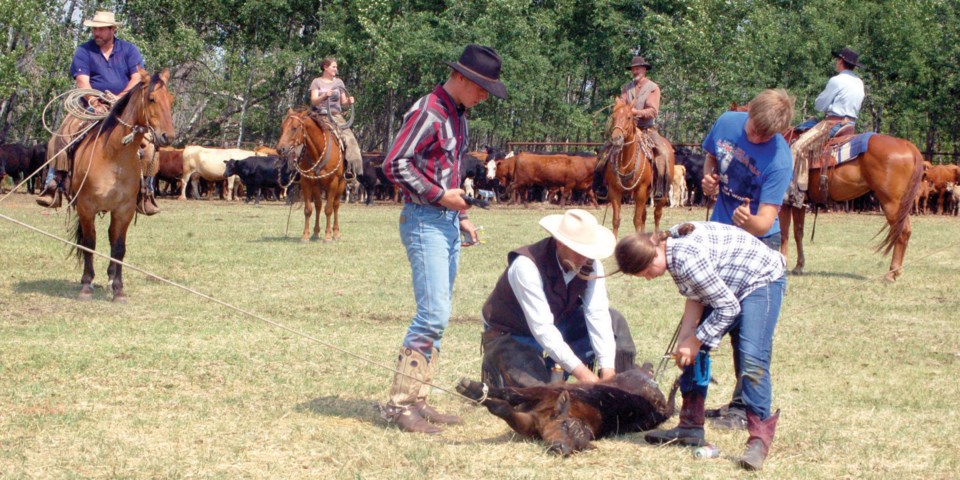(see photo gallery below)
From a young age, Ted Isaac had always dreamed of riding the range with just his horse for companionship. Today he has incorporated that vision into his ranching, using horses and applying the traditional ways of the cowboy. Working his family ranch requires a hands-on commitment and incorporates the entire family and several friends.
Spring time is one of the busiest times on the ranch because it involves roping calves from horseback and branding in the pasture, rather than using the commercial head gates used by many producers today.
“I am most comfortable on a horse and it is less stressful for the cows and calves as we rope and brand each calf prior to going to pasture. Each fall, we bring in the calves and cows to sort for market or for keeping,” he said. Isaac does use some commercial farm implements for haying and at harvest time but he chooses to apply the cowboy way of life when working with cattle.
Isaac grew up on a farm in northern Alberta, one of nine children, and was always interested in the cattle industry, especially working with horses which played a huge factor in the way Isaac ranches today. As a teenager he sought out a mentor from whom he could learn the skills and gain the experience of operating a ranch with the hopes of one day owning his place. For seven years, he learned under the mentorship of Bruce Bartel of Carrot River who owned a 150 cow-calf and small feedlot operation.
His dream came closer to a reality when at the age of 18 years, he purchased a number of cows with the support of his parents. He carefully researched different breeds and with his mentor's guidance, he selected the Angus-cross breed that were known for easier calving and good mothering ability. A few years later he met the love of his life and was married at the young age of 20 years.
Soon afterwards, the couple purchased their first farm, a half section by Carrot River. They went into livestock hauling, and log and wood chip hauling as a way to diversify the farm. Over the next five years, the couple started their family and lived off their ranch but it all changed in 2003 when BSE hit beef producers.
“It hit our business hard and pretty much shut us down,” said Isaac. “The next eight years were difficult with the full extent of BSE hitting us three years later after the first BSE incident. We made do through sheer determination of wanting to preserve our dreams and goals. There was a time we almost got out but for the family we decided to stick it out. We started custom feeding cattle which allowed us a monthly income and allowed me to be able to stay at home with my young family. We started growing our own Angus-cross herd as things started to get better.”
Through the next several years, Isaac grew frustrated with the wet land conditions in Carrot River and made the decision in 2011 to lease seven and half sections of grassland by Endeavour. In 2012 the family purchased five quarters by Lady Lake to where they would move and start a new life for their family.
Isaac currently owns 320 Angus-cross cattle. He grazes the cattle through the summer and custom feeds 1,200 head over the winter. He seeds 700 acres of cereal crops, 500 acres of silage and 250 acres used for the feedlot.
“We hay 800 acres, but this year with the dry conditions we had this spring it has created some hay shortages. The silage crop is great but the hay is a problem. We are going to be looking at purchasing hay as well as the possibility of cutting some older stock,” said Isaac.
“Using the old cowboy ways not only is less stressful for the cattle but it is also instilling positive qualities within our own family. During branding times, we are never short of help with a positive atmosphere created by the cowboy traditions. There is also a certain skill level in roping calves which is usually met with some good old challenges by the ropers on horseback. We currently have 10 horses that are good ranch horses that work well with the cattle. We are in the cattle business for the long haul but we are still siding on the side of caution. There is a cycle for everything and our success is attributed to family, friendships, spiritual relations and my great mentor who I am still learning from today,” he said.
Isaac is also involved in the Lazy K Feeder and Breeder Cooperative.
“The coop is a great way for a young guy to get a line of credit to build his own herd. It is progressive with great dividends for the farmer. Agriculture has a bright future and has treated us well over the past 20 years. I sincerely hope that my children would follow in my footsteps or forge their own paths in agriculture,” said Isaac.




